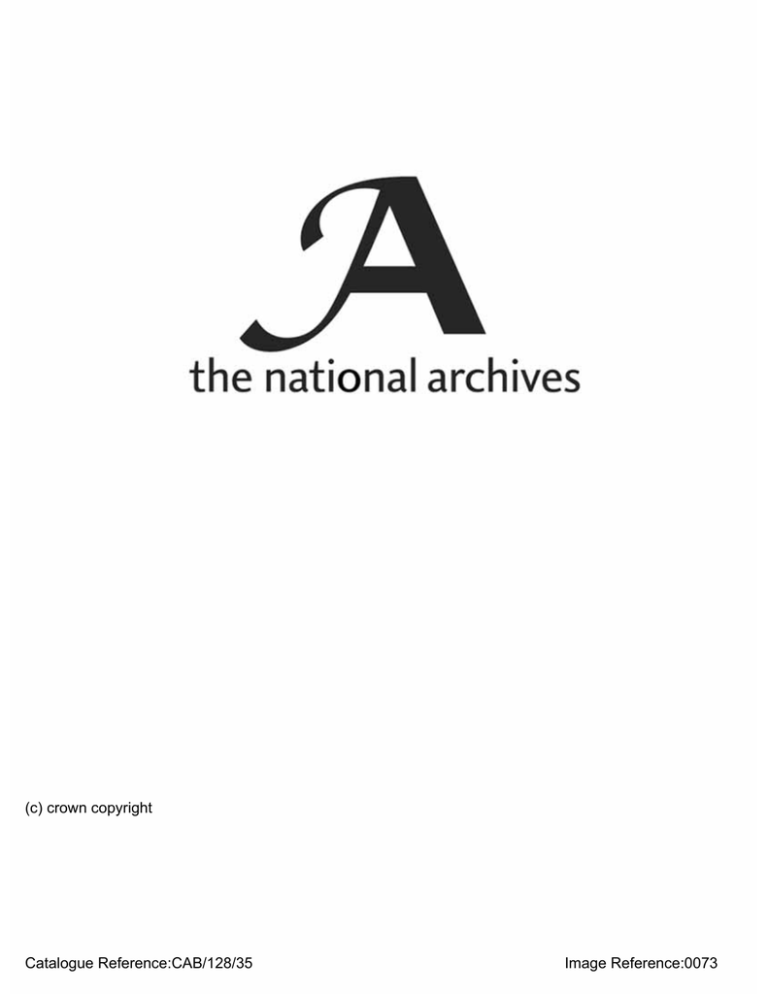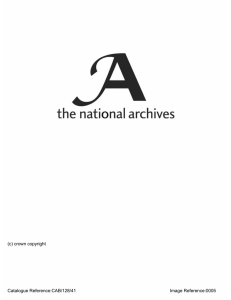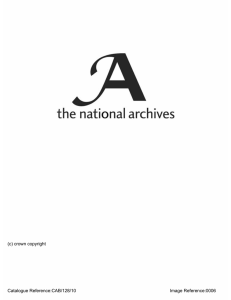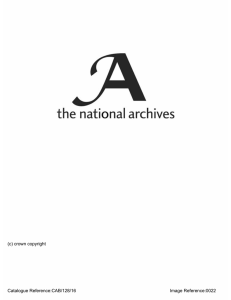(c) crown copyright Catalogue Reference:CAB/128/35 Image Reference:0073
advertisement

(c) crown copyright Catalogue Reference:CAB/128/35 Image Reference:0073 THIS DOCUMENT IS T H E PROPERTY OF HER BRITANNIC M A J E S T Y ^ GOVERNMENT Printed for the Cabinet. December 1961 CC. (61) 73rd Conclusions Copy. No. IS CABINET CONCLUSIONS of a Meeting of the Cabinet held in the Prime Ministers Room, House of Commons, S.W.1, on Wednesday, 13th December, 1961, at 4.15 p.m. Present: The Right Hon. R. A . BUTLER, M . P . , Secretary of State for the Home Department (in the Chair) The Right Hon. VISCOUNT KILMUIR, Lord Chancellor T h e Right Hon. HENRY BROOKE, M.P., Chief Secretary to the Treasury and Paymaster General. T h e Right Hon. IAIN MACLEOD, M . P . , Chancellor of the Duchy of Lancaster The Right Hon. PETER THORNEYCROFT, M.P., Minister of Aviation T h e Right Hon. REGINALD MAUDLING, M . P . , Secretary of State for the Colonies The Right Hon. VISCOUNT HAILS HAM, Q.C., Lord President of the Council and Minister for Science The Right Hon. JOHN MACLAY, M.P., Secretary of State for Scotland The Right Hon. Sir DAVID ECCLES, M.P., Minister of Education The Right Hon. LORD M I L L S , Minister without Portfolio Dr. The Right Hon. CHARLES HILL, M R , Minister of Housing and Local Government and Minister for Welsh Affairs The Right Hon. ERNEST MARPLES, M . P . , The Right Hon. CHRISTOPHER SOAMES, Minister of Transport M.P., Minister of Agriculture, Fisheries and Food The Right Hon. FREDERICK ERROLL, M.P.. President of the Board of Trade Also Present: The Right Hon. MARTIN REDMAYNE, M.P., Parliamentary Secretary, Treasury Secretariat : The Right Hon. Sir NORMAN BROOK Mr. A . L. M. CARY : CONTENTS Minute No. 1 Subject Education Expenditure Education Colleges of Advanced Technology Education Expenditure (Previous Reference: C C . (61) 67th Conclusions, Minute 7) 1. The Cabinet had before them memoranda by the Chief Secretary, Treasury ( C (61) 210) and the Minister of Education (C. (61) 212) oii the level of educational expenditure in the period up to 1965-66. The Chief Secretary, Treasury, said that the Treasury were seeking to contain the expansion of public expenditure within the limits of the increase in the gross national product, which was estimated at something between 2£ and 3 per cent, for this period. An expansion of 2\ per cent, had been agreed for the National Health Service; and, for the education programme, he had been ready to concede a higher figure of 3 per cent. Current expenditure on education was now running at the rate of £694 million a year; and a 3 per cent, increase would bring it u p to £780 million in four years. The Minister of Education was, however, anxious to adhere to a programme rising to £830 million in four years, and thus involving an annual increase of 4*6 per cent. This was in his view too high; with an annual growth of 3 per cent, it should still be possible to plan for steady and acceptable expansion. In investment, as opposed to current expenditure, the Minister^ programme also showed a steady increase, rising from £117 million in 1961-62 to £139 million in 1965-66. In the present state of our resources increases of this order in educational building could not be authorised unless compensating reductions were made in other services. The Chancellor of the Exchequer had suggested that the programme should be stabilised at £120-5 million for the three-year period up to 1965-66. This was an increase of £3 million a year over the level for the current three-year period. He recognised that this would involve the postponement of projects in the 1962-63 programme which had already been approved, but he saw no alternative. The Minister of Education said that the only practicable way to get a substantial saving in current expenditure would be by reducing the supply of teachers. But even under present plans he was faced with the prospect next year of having to turn away 2,000 qualified applicants for teacher training because there would be no room for them in the training colleges. T o restrict the programme deliberately at this stage seemed to him to be politically and economically indefensible. The growth in national resources on which all Government expenditure was dependent would be greatly influenced by our success in improving and expanding the educational services. This in turn was governed by the supply of teachers. Against this background it was difficult to see how to make cuts in the educational building programme which would have any effect on current expenditure at all. He had set out in his paper (paragraph 5) the main elements in the present programme. It was impossible to reduce that part of the programme which aimed at providing school places for children who would otherwise have no school to go to. The reorganisation of all-age schools had been *niilt into the Education Act. 1944. and had consistently figured in the Conservative programme for education. A pledge had been given in the White Paper of 1958 that the programme would be completed in five years and under present plans this would be achieved, except in Liverpool, where there were special problems. Those parts of the programme which aimed at providing better scientific and workshop facilities were also essential. Thus, the only part of the programme in whi^h reductions could be made was that for the replacement and rebuildii. of out-of-date and unsatisfactory schools. Work under this he- t was now concentrated largely on secondary schools. As new schools were built, political pressure for the replacement or rebuilding of the older schools increased. Moreover, postponements or reductions in the replacement programme would not produce any saving in current expenditure. It could indeed be argued that current 6O20O-11 B 2 expenditure would increase if the programme were held back, for the older schools were more expensive to run. There was also a difficult question of timing. If the programme in later years were to be cut t o the figure of £120-5 million which the Chancellor of the Exchequer had suggested, it would be necessary to postpone projects already approved for 1961-62 and 1962-63. This was because building costs were greatest in the second and third years of any given project. It did not seem to be politically practicable to announce at this stage major cuts in the school building programme for next year. This would be interpreted as a policy of restriction, not of growth, and would be repudiated by public opinion. In discussion the following points were made: (a) On present evidence a serious shortage of teachers was forecast for 1970. This would make it very difficult to defend a policy which could be interpreted as restricting still further the supply of teachers. This argument applied with particular force to technical education in view of the emphasis placed on the need to improve the facilities for technical training generally, and the expansion of day­ release schemes for industry. (b) It was not clear that it would be necessary to cut projects out of the building programme altogether. It was rather a question of controlling starting dates and spreading out the programme over a longer period. Increases in the later years of the period might be more manageable than increases now. Nevertheless, it was probable that any substantial postponement of new starts would be represented as a cut in the education programme. (f) It was difficult for Ministers to take a final decision about investment expenditure in education without considering at the same time plans for capital expenditure elsewhere, particularly on housing and roads. Comprehensive proposals had been put before the Economic Policy Committee but had not been circulated to the Cabinet. Priorities were changing all the time. Housing, for example, had been the highest priority 10 years ago; it had dropped back in the interval but was now likely to rise again. Slum clearance would be a major political issue in the following year. (d) From a national point of view it was by no means clear that 4-6 per cent, would be regarded as an excessive increase in expenditure on education and there would certainly be many who would argue that an increase of 3 per cent, was too small. (e) It would be helpful to the Cabinet to see in some detail the effect of reducing the investment programme for school building by stated amounts; as well as the figure of £120-5 million which the Chancellor of the Exchequer had suggested higher figures of, say, £125 million and £130 million should also be examined. The C a b i n e t ­ (1) Invited the Minister of Education to circulate a paper setting out the effect of reducing the education investmei t programme for the period 1963 64 to 1965-66 from its present planned level to an average of £130 million, £125 million and £120 million. (2) Invited the Chief Secretary, Treasury, to circulate, for the information of the Cabinet, a paper showing the present plans for civil public investment as a whole in the three years in question. (3) Agreed to resume their discussion at a later meeting Education Colleges of Advanced Technology (Previous Reference : C C . (61) 67th Conclusions. Minute 7) 2. T h e Cabinet again considered the memorandum by the Minister of Education (C. (61) 191) on the transfer of Colleges of Advanced Technology to direct grant. The Minister of Education said that arrangements to transfer these Colleges to direct grant were well advanced. Great importance had been attached to the transfer by the Chairman of the Committee on Higher Education, who had urged him to proceed with it in advance of the publication of the Committees report. This course was also supported by leading scientists, who deplored the original decision to set up the colleges under the control of local authorities. The transfer would not result in any increase in public expenditure. It involved no more than a bookkeeping transaction under which some £5 million would be transferred from the rates to the Exchequer. If at this late stage he had to tell the local authorities that the transfer was to be postponed for a year he would be placed in an embarrassing position. The local authorities, although they had at first been unwilling to accept the transfer, had in the end been most co-operative; to tell them now that they would have to carry the load on the rates for an extra year and hand over control at the end of that time would create a major grievance. They might well want to re-negotiate the terms of transfer, with increased cost to the Exchequer. The Chief Secretary, Treasury, said that much more than a book­ keeping transaction was involved. The Chancellor of the Exchequer had given a specific pledge to restrict the rise in the 1962-63 Estimates to no more than 2\ per cent, above the level for 1961-62. T h e whole of the £5 million involved in this transfer would fall on the Estimates and some other saving would have to be found to make room for it. The Cabinet had already considered painful changes designed to secure economies, e.g., in the nutritional services, and were still far short of the total of £100 million which was required. T o accept this extra £5 million now would add unnecessarily to their difficulties. It was not strictly true to say that the salaries of the teachers at the colleges would be affected by the delay; they had already been promised substantial increases from 1st April, 1962, and it was most unlikely that any further increases could be negotiated before April 1963. The reaL trouble was the fact that the estimated cost of the colleges had risen so steeply. The Chancellor of the Exchequer would have been prepared to carry the extra £1$ million which was at first thought to be involved; but it was much more difficult to absorb the revised figure of £5 million. In discussion to following points were m a d e : (a) It was undeniable that the Chancellors pledge related in terms to the level of Estimates and not to public expenditure as a whole. T o accept the extra £5 million for the colleges would involve finding an equivalent saving elsewhere, unless it could be argued that the cost of the colleges represented new business which had accrued since the framing of the 1961-62 Estimates, and could for that reason be excluded from the calculation of the 2$ per cent, increase. (/)) It was difficult to take a final decision without knowing more about the savings which might have to be made in other directions in order to reach the total of £100 million involved in the Chancellor^ pledge. Further delay would make it even more difficult to persuade local authorities to accept postponement of the date of transfer with good grace. Nevertheless this risk would have to be accepted. The Cabinet— Agreed to resume their discussion at a later date when had been made in reducing the Estimates mor e progress progre for 1962-63.



